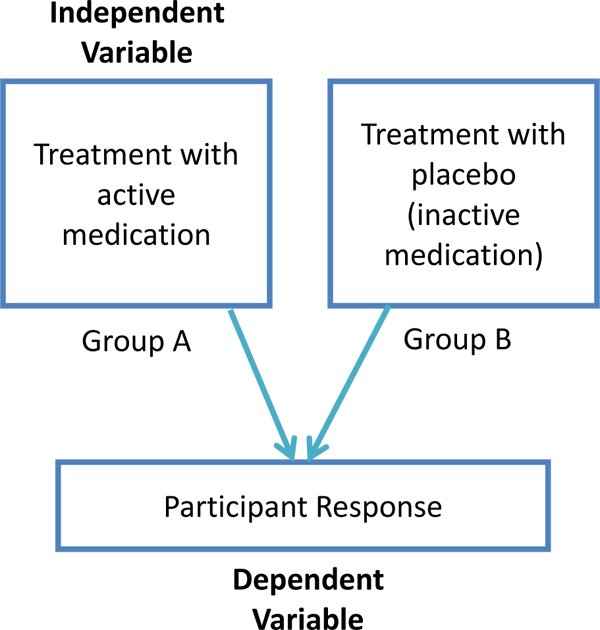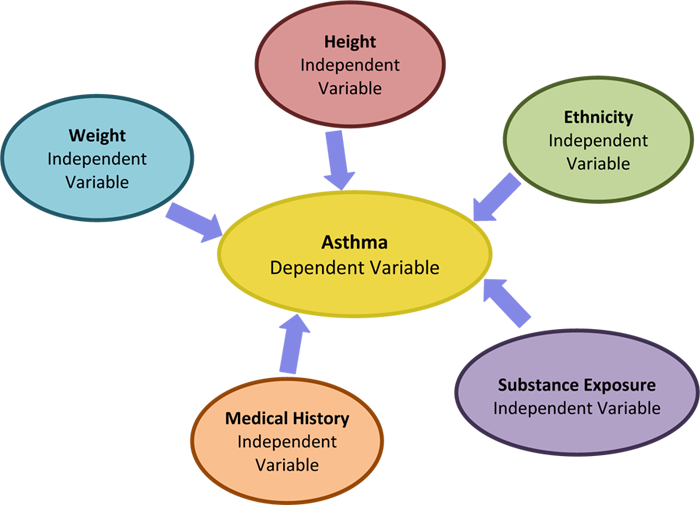Module 3: Elements of Research - Section 1
Section 1: Variables
The purpose of all research is to describe and explain variance in the world. Variance is simply the difference; that is, variation that occurs naturally in the world or change that we create as a result of a manipulation. Variables are names that are given to the variance we wish to explain.
A variable is either a result of some force or is itself the force that causes a change in another variable. In experiments, these are called dependent and independent variables respectively.

 When a researcher gives an active medication to one group of people and a placebo, or inactive medication, to another group of people, the independent variable is the medication treatment. Each person's response to the active medication or placebo is called the dependent variable.
When a researcher gives an active medication to one group of people and a placebo, or inactive medication, to another group of people, the independent variable is the medication treatment. Each person's response to the active medication or placebo is called the dependent variable.
This could be many things depending upon what the medication is for, such as high blood pressure or muscle pain. Therefore, in experiments, a researcher manipulates an independent variable to determine if it causes a change in the dependent variable.
As we learned earlier in a descriptive study, variables are not manipulated. They are observed as they naturally occur and then associations between variables are studied. In a way, all the variables in descriptive studies are dependent variables because they are studied in relation to all the other variables that exist in the setting where the research is taking place. However, in descriptive studies, variables are not discussed using the terms "independent" or "dependent." Instead, the names of the variables are used when discussing the study. For example, there is more diabetes in people of Native American heritage than people who come from Eastern Europe. In a descriptive study, the researcher would examine how diabetes (a variable) is related to a person's genetic heritage (another variable).
Definition: A variable is either a result of some force or it is the force that causes a change in another variable. In experiments, these are called dependent and independent variables respectively.
Case Examples for Independent and Dependent Variables
Example 1:
 In an experimental study looking at classical music exposure and reading ability in children, the researcher divided the children into two groups (Groups A and B). In Group A, the children listened to Mozart for one hour every day for one month. In Group B, parents were instructed to refrain from playing classical music around the child for one month. At the end of the month, all children were given a reading comprehension test. Those who listened to Mozart daily (Group A) scored significantly higher on the reading test. In this case, the reading comprehension test score is the dependent variable and exposure to Mozart’s music is the independent variable. This is because the test score is dependent on whether or not the child listens to Mozart’s music. The independent variable, exposure to Mozart’s music, is independent because it is something that can be manipulated or changed by the researcher.
In an experimental study looking at classical music exposure and reading ability in children, the researcher divided the children into two groups (Groups A and B). In Group A, the children listened to Mozart for one hour every day for one month. In Group B, parents were instructed to refrain from playing classical music around the child for one month. At the end of the month, all children were given a reading comprehension test. Those who listened to Mozart daily (Group A) scored significantly higher on the reading test. In this case, the reading comprehension test score is the dependent variable and exposure to Mozart’s music is the independent variable. This is because the test score is dependent on whether or not the child listens to Mozart’s music. The independent variable, exposure to Mozart’s music, is independent because it is something that can be manipulated or changed by the researcher.
Example 2:
 In a study with a similar design as the previous example, researchers looked at the effects of nutrition on reading ability. In Group A, children ate at least three ounces of dark green vegetables every day for one month. In Group B, children were fed their regular diet. At the end of the month, the children took a reading comprehension test. Those who ate the green vegetables every day for one month (Group A) did not vary in their test scores when compared to Group B.
In a study with a similar design as the previous example, researchers looked at the effects of nutrition on reading ability. In Group A, children ate at least three ounces of dark green vegetables every day for one month. In Group B, children were fed their regular diet. At the end of the month, the children took a reading comprehension test. Those who ate the green vegetables every day for one month (Group A) did not vary in their test scores when compared to Group B.
Section 1: Discussion Questions
- In the second example what is the independent variable? Why?
- In the second example, what is the dependent variable? Why?
- Identify which variables are dependent and independent in the following examples:
Example:
- Physical activity and weight loss
Dependent Variable: weight loss
Independent Variable: physical activity
- Positive feedback and self confidence
Dependent Variable:
Independent Variable:
- Headache and aspirin
Dependent Variable:
Independent Variable:
- Muscle mass and weight-training
Dependent Variable:
Independent Variable:
- Calcium consumption and bone density
Dependent Variable:
Independent Variable:
- Blood pressure and salt intake
Dependent Variable:
Independent Variable:
Variables are important to understand because they are the basic units of the information studied and interpreted in research studies. Researchers carefully analyze and interpret the value(s) of each variable to make sense of how things relate to each other in a descriptive study or what has happened in an experiment.
Definition: Variables are characteristics studied in research that can take on different values (e.g., weight, height, exposure to a substance, demographics (i.e., where you live, your ethnicity, how much income you have, medical background).

Case Example for Descriptive Study Variables
See if you can identify the variables that are under investigation in the following descriptive study:
Many children who live in the Bronx, a borough of New York City, are developing asthma. In a descriptive study investigating this problem, parents whose children have asthma are asked about whether they smoke around their child, whether they live near a freeway, whether their child regularly sees a healthcare provider, their family income level and also if there is a history in their family of asthma. Prior research has shown that these factors may have an influence on the development of asthma in children.
Section 1: Discussion Questions
- What are the variables that are under investigation in this study?
- If you were the researcher, what other variables would you study to see if it may contribute to developing asthma? Why?
- Given the variables presented in the example and the variables that you thought of, why would these variables be useful to the researcher?





